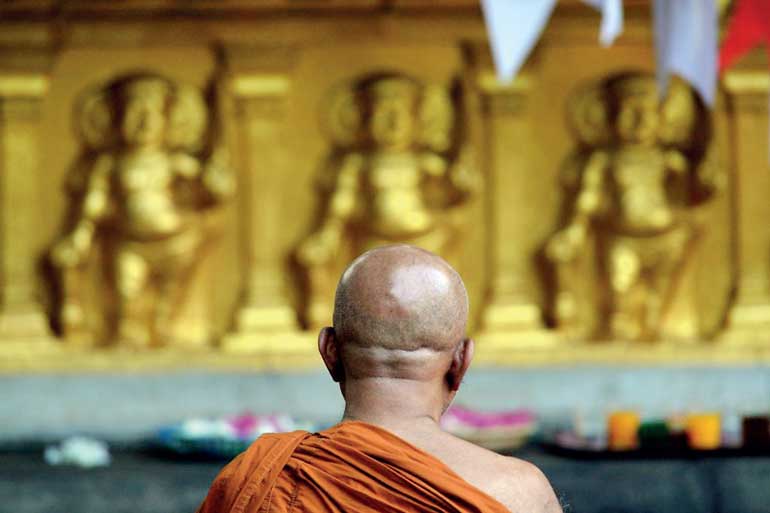Wednesday Feb 18, 2026
Wednesday Feb 18, 2026
Wednesday, 9 February 2022 00:00 - - {{hitsCtrl.values.hits}}

Understandably, we are indignant when those claiming moral authority over us, a priest, a teacher, a judge, strays across the line of rectitude
“False face must hide what the false heart doth know” – Macbeth-Shakespeare
The reach of the modern media is limitless; lifting the cloak on institutions which for centuries had remained inviolable, its light flashing into each nook and corner, challenging long-held beliefs, remaking our opinions on every man and matter.
our opinions on every man and matter.
Circulating on the internet recently were some pictures/videos of a supposed Buddhist priest with a female companion, allegedly his mistress. Found in a compromising situation, they were surrounded by angry devotees of his temple, probably the arrangers of the entrapment, and some police officers. His private life bared to the wide world, the priest was hardly coherent. The female companion for some reason appeared to be handcuffed, adding further humiliation to the feeble, one most vulnerable.
Understandably, we are indignant when those claiming moral authority over us, a priest, a teacher, a judge, strays across the line of rectitude. Not only do they occupy socially important positions, their situation confers a certain authority transcending legal definition. Respect is accorded to them; the society at large will defer respectfully to their opinion. Often, held up as worthy, we look to them for guidance, exemplars for the younger generation.
We humans are fallible, often faltering, failing, betraying the principles we profess. In a society in obvious decay, such failings are rampant, everything is in turmoil; there are no norms or standards, anything goes; mammon is the only true god. We see this decline particularly in the clergy, a much-diminished institution today.
Far from the religion’s fundamental asceticism and renunciation of the worldly life, the order has become an institution awash in the material. Obtaining rich patrons, brokering power and gathering wealth; the institution is given more to the ritualistic aspects of religion; forgoing the essential, for the pursuit of the illusion. There is a gaping chasm between the inspiring philosophy of Buddhism and the real lives of its adherents, observably flawed in both character as well as of mind.
If the clergy is diminished, it is the overwhelming theme of the layman; lives highlighted only by their acts of foolishness, incompetence, lies and deceit.
Who among those angry devotees of the temple could cast the first stone?
If we assume that the average devotee is a creature of the society he comes from, and at the same time, partly responsible (however small that responsibility) for the country around him, a tentative character sketch suggests itself.
Instinctive, discontent, superstitious, a life commonplace in every aspect. Religion for him is the occult, worshipping of false gods and indulging in lurid rituals. He will grovel before those he considers his superiors, pleading for favours and benefits. His working life is marked by an indifferent performance at the work place, taking/giving of bribes, making of false expense claims and stealing from the employer. It is not enough, for further prosperity he pleads to a pantheon of gods. To ease a heavy conscience, the man may occasionally indulge in a so-called religious rite or an act of charity, whenever possible, giving the exercise wide publicity. Here is a pious man, the multitude will proclaim!
Hypocrisy is the name of the hand that casts the stone.
The woman, whose liaison led to the handcuffing by the police brought to mind the blurb on the back cover of my copy of “Nineteen Eighty-Four”, George Orwell’s masterly satire on power, perverted.
“The ‘Party’ rules by the agency of four Ministries: The Ministry of Peace which deals with war, the Ministry of Love which deals with law and order, the Ministry of Plenty which deals with scarcities and the Ministry of Truth which deals with propaganda!”
One is made to wonder why the police is so heavily involved in a matter which is primarily a question of private morals. If they feared a breach of the peace, was that female the prime source of the potential threat? In the course of duty, one must rise above the temptation towards the vulgar or the cheap scandal.
For several decades now, it has been apparent that in its standing as well as service quality, our police force is steadily falling behind law and order institutions of other countries, particularly the British constabulary on which it was originally modelled. Politicisation, bad leadership and substandard recruitment has eroded the public confidence in the force; rather than a protector, a visit to a police station is an experience to be dreaded, an encounter with a dark and obscure world.
An observer may well assume that the persecution of opponents of the government and the clearance of the roads for the easy passage of the fast-moving convoys of government leaders, are the two main functions of our police. This is the rule with all governments, the intensity of these two activities however change according to the mentality of the different rulers. So poorly are the police equipped for other duties that often the victims of robberies and other similar offences have to provide the transport for the police to visit the scene of the crime. However, if the complainant is a politician in power, their basic instinct is to scramble with lightning speed. A force maintained with the tax money of all citizens, functioning for the benefit of a select few.
Meanwhile, what will become of the romantic priest and his mistress?
For that, we will need to await another Orwell to give us a Ministry of Morals.